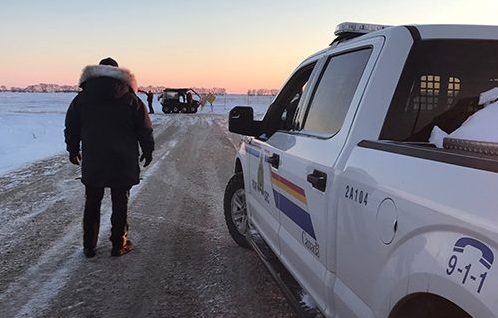Florida man charged in Canada U. S. human smuggling scheme freed on appearance bond

Editor’s note: The RCMP has said the gender of one of the bodies found was mis-reported. The article has been updated to reflect the change.
A Florida man charged for his role in a human-smuggling scheme that turned deadly at the Canada-U. S. border will be allowed to go home to await trial.
Steve Shand, 47, waived his right to a preliminary hearing before U.S. district court Judge Hildy Bowbeer agreed to release him from a North Dakota detention centre.
Advertisement
He faces human-smuggling charges after he was arrested near the border last week behind the wheel of a rented passenger van, not far from where a family of four was found frozen to death in the snow on the Canadian side.
Shand, clad in orange prison garb and a black face mask, said little throughout the virtual hearing beyond “Yes, your Honour” and “Yes, ma’am” in response to Bowbeer’s questions.
Shand was released on an appearance bond, meaning that while he must abide by a number of release conditions, he will be required to make his own way back to Minnesota for any in-person court hearings.
RELATED:
- Man charged after four bodies including infant found in Manitoba near border
- Prime minister calls freezing deaths of four near U.S. border mind boggling, tragic
“Sometimes we do it by Zoom and sometimes we may be doing it in person, but however it is that a court hearing happens in this case, you’re going to have to show up for it,” Bowbeer said.
“The fact that you’re living in Florida is not going to be an excuse for not showing up in Minnesota.”
Advertisement
He will also be required to surrender his passport and other related travel documents, submit to a mental-health assessment and remain in his home district in Florida except for court hearings.
He is also forbidden from possessing any weapons and from having any contact with any witnesses or others associated with the case, and will be expected to abide by the law, Bowbeer said.
“There’s this kind of snowballing set of consequences, all of them bad, if you were to commit some new offence while you’re on release,” she said.
Monday’s court decision was the product of an agreement between U.S. prosecutors and Shand’s defence lawyers, and resulted in the accused opting to waive his right to a preliminary hearing.
Shand was arrested Jan. 19, the same day the bodies of four people, including an infant and a teenage girl, were discovered in the snow on the Canadian side of the border near Emerson, Man.
Advertisement
Investigators believe the four were part of a larger group of undocumented migrants from India who were trying to enter the U.S. from Canada.
The bodies were discovered Wednesday, shortly after U.S. Border Patrol agents pulled over a passenger van on the American side and found two other undocumented Indian nationals inside.
At about the same time, agents encountered another group of five migrants, one of whom told the agents they had been walking through the snow and bitter cold for more than 11 hours.
Department of Justice officials say the deaths are likely linked to a larger human smuggling operation – a phenomenon that’s practically a fact of daily life in the southern U.S., but rarely seen up north.
Agents encountered the van “in a rural area on a dirt road in an area far away from any services, homes or ports of entry into Canada,” according to an affidavit by John Stanley, a special agent with the Department of Homeland Security.
Advertisement
“He was driving through blowing snow and snow drifts. The weather was severe at the time, with high winds, blowing snow and temperatures well below (-34 C).”
Evidence detailed in the documents also suggest the group was not the first to recently make the perilous trek: twice in December and once in January, border patrol agents found boot prints in the snow near where the van was later pulled over.
On Jan. 12, agents found prints that “matched the brand of the types of boots worn by five of the seven foreign nationals arrested in the current smuggling event,” the documents say.
On or about Dec. 12 and Dec. 22, “two groups of four appeared to have walked across the border into the U.S. and were picked up by someone in a vehicle.”
In the first incident, RCMP officers found a backpack at a location in Manitoba “believed to be the drop-off point” that contained a price tag in Indian rupees.
Advertisement
A court file from Florida that dates back to 2018 shows that Shand, a naturalized citizen originally from Jamaica, filed for bankruptcy more than three years ago, reporting assets worth $193,343 and liabilities of nearly $160,000.
Describing himself as an Uber driver, Shand’s assets at the time included two vehicles – a 2016 Toyota SUV and a 2014 Honda Civic – and the $161,957 single-family home in the central Florida community where he lives.
Consular officials met over the weekend in Winnipeg to assist with the investigation and to help identify the migrants and track down family members.
“A special team, led by a senior consular officer from the Consulate General of India in Toronto, is in Manitoba to assist ongoing investigations by Canadian agencies and to render any required consular services for the victims,” the High Commission of India said in a statement.
“Confirmation of identities will only be possible after investigations are completed this week.”
Advertisement
This report by The Canadian Press was first published Jan. 24, 2022.